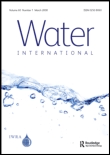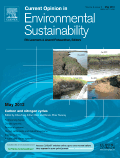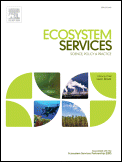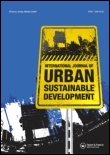
Ecosystems and People
Scope & Guideline
Connecting People with the Pulse of Our Ecosystems
Introduction
Aims and Scopes
- Interdisciplinary Research:
The journal focuses on integrating ecological and social sciences to understand the complex interactions between human societies and ecosystems. - Participatory Approaches:
It promotes research that involves stakeholder engagement and participatory methodologies, ensuring that local knowledge and values are recognized in environmental governance. - Cultural Ecosystem Services:
Emphasis on understanding and valuing cultural ecosystem services, which are essential for human well-being and community identity. - Social-Ecological Systems:
Research frequently examines social-ecological systems (SES), exploring how social dynamics influence ecosystem management and vice versa. - Relational Values and Governance:
The journal highlights the role of relational values in governance frameworks, advocating for a shift from traditional stewardship to partnerships with nature. - Sustainability Transformation:
Focus on transformative processes and pathways towards sustainable practices in diverse contexts, including urban and rural landscapes.
Trending and Emerging
- Relational Approaches to Sustainability:
An increasing number of papers explore relational approaches, emphasizing the connections between humans and nature, and the co-production of knowledge and values. - Cultural and Indigenous Knowledge:
There is a growing focus on incorporating cultural and Indigenous knowledge systems into ecosystem management, recognizing their importance in enhancing resilience and sustainability. - Urban Ecosystem Dynamics:
Research on urban ecosystems is gaining traction, particularly studies addressing the role of urban green spaces and their contributions to human well-being. - Climate Change Adaptation:
Emerging themes around climate change adaptation strategies are prominent, with a focus on local and context-specific solutions that involve community engagement. - Transdisciplinary Research:
The journal increasingly supports transdisciplinary approaches that bridge the gap between scientific research and practical applications in policy and community settings. - Ecosystem Services and Well-being Nexus:
There is a notable trend towards exploring the connections between ecosystem services and human well-being, emphasizing the need for integrated assessments that consider social equity.
Declining or Waning
- Traditional Conservation Approaches:
There is a noticeable decrease in papers focused solely on traditional conservation strategies, as the journal shifts towards more integrative and participatory governance models. - Single-Disciplinary Studies:
Research that focuses on isolated ecological or social aspects without considering the broader interdisciplinary context has become less frequent, indicating a preference for more holistic approaches. - Static Ecosystem Valuation:
The journal has moved away from static assessments of ecosystem services, favoring dynamic, context-sensitive evaluations that incorporate social and cultural dimensions. - Top-Down Management Strategies:
Research advocating for top-down management of ecosystems is declining, as the journal increasingly emphasizes community-led and participatory management practices. - Generalized Ecosystem Service Frameworks:
There is a waning interest in generalized frameworks for ecosystem services that do not account for local context and cultural relevance, reflecting the need for tailored approaches.
Similar Journals

INTERNATIONAL REVIEW OF HYDROBIOLOGY
Connecting Minds to Address Environmental ChallengesINTERNATIONAL REVIEW OF HYDROBIOLOGY is a prestigious academic journal dedicated to the dynamic fields of Aquatic Science and Ecology, Evolution, Behavior, and Systematics. Published by a reputable German publisher, this open-access journal ensures that groundbreaking research is readily available to a global audience, fostering collaboration and innovation within the scientific community. With an impressive impact factor and classification within the Q2 category of both Aquatic Science and Ecology, it ranks notably high on Scopus, standing at 211 out of 721 in Ecology and 84 out of 247 in Aquatic Science as of 2023. Covering a broad scope from fundamental hydrobiological research to applied ecological studies, the journal plays a crucial role in advancing knowledge and addressing contemporary environmental challenges. Researchers, professionals, and students will find INTERNATIONAL REVIEW OF HYDROBIOLOGY to be an essential resource for informing their own work and contributing to the global dialogue on aquatic systems and their conservation.

WATER INTERNATIONAL
Fostering Interdisciplinary Dialogues on Water SustainabilityWATER INTERNATIONAL is a leading journal in the realms of water science and policy, published by Routledge Journals, Taylor & Francis Ltd. With its ISSN 0250-8060 and E-ISSN 1941-1707, the journal has maintained a robust scholarly presence since its inception in 1975, with contributions focused on management, monitoring, and policy pertaining to water resources. Currently convening from 1975 to 2024, WATER INTERNATIONAL is recognized for its significant impact, reflected in its Q2 category rankings within Environmental Science sectors—ranked #157/399 in Management, Monitoring, Policy and Law, and #103/261 in Water Science and Technology. The absence of an open access option does not diminish its importance, as it continues to serve as a crucial platform for interdisciplinary researchers, professionals, and students aiming to address the challenges surrounding water governance and sustainability. With its focus on innovative methodologies and policy-oriented research, the journal stands at the forefront of advancing knowledge in water resource management.

Current Opinion in Environmental Sustainability
Exploring Innovative Pathways to a Sustainable FutureCurrent Opinion in Environmental Sustainability, published by Elsevier Science Ltd, is a leading academic journal that specializes in exploring innovative strategies and emerging trends in environmental sustainability. With an impressive impact factor that reflects its esteemed position within the field, this journal is classified as Q1 in both the Environmental Science and Social Sciences categories for 2023, indicating its high-quality and influential contributions. The journal has been at the forefront of sustainability discussions since its inception in 2009 and continues to provide a platform for multidisciplinary research and critical analysis. As a key resource for researchers, professionals, and students alike, Current Opinion in Environmental Sustainability ensures open access to valuable insights while fostering collaboration and knowledge sharing across various domains. This journal not only serves to inform and inspire but also aims to address the pressing challenges of sustainability in our evolving world, making it an essential read for anyone engaged in environmental studies.

Landscape and Ecological Engineering
Empowering conservation through innovative methodologies.Landscape and Ecological Engineering, published by SPRINGER JAPAN KK, is a vital journal that serves as a platform for the dissemination of innovative research and methodologies in the fields of landscape ecology and environmental engineering. With an ISSN of 1860-1871 and E-ISSN 1860-188X, this journal showcases articles that address the dynamic interplay between ecological processes and engineering designs in both natural and urban environments. As a significant publication since its inception in 2006, it is recognized in the Q2 quartile for Ecology and Nature and Landscape Conservation, alongside its placement in the Q3 quartile for Management, Monitoring, Policy, and Law, ensuring its relevance across multiple dimensions of environmental studies. The journal's presence in prominent databases, reflected in its Scopus rankings, highlights its commitment to high-quality, impactful research that guides conservation strategies and landscape management practices. Engaging with Landscape and Ecological Engineering provides researchers, professionals, and students with critical insights and developments, promoting sustainable solutions for ecological challenges. This journal is an essential resource for anyone seeking to enhance their understanding of ecological engineering approaches and landscape conservation efforts.

Ecosystem Services
Innovating solutions for ecosystem sustainability.Ecosystem Services, published by Elsevier, is a leading interdisciplinary journal dedicated to advancing research in the field of ecosystem services and their critical role in environmental sustainability and resource management. With an impact factor underscoring its significance, this journal proudly holds a prestigious Q1 ranking in multiple categories, including Agricultural and Biological Sciences, Ecology, and Global and Planetary Change, indicating its strong influence and high-quality contributions to various scientific domains. Established in 2012 and running through to 2024, Ecosystem Services aims to publish innovative research that explores the complex interactions between ecosystem services and human well-being. This journal is particularly valuable for researchers, policymakers, and practitioners dedicated to understanding and enhancing the natural systems that underpin life on Earth. By facilitating open access to cutting-edge studies and reviews, Ecosystem Services serves as a vital resource for promoting informed decision-making and fostering sustainable development practices globally.

ENVIRONMENTAL MANAGEMENT
Innovating solutions for pressing environmental challenges.ENVIRONMENTAL MANAGEMENT, published by Springer, stands at the forefront of advancing sustainability and ecological stewardship in the fields of Ecology, Global and Planetary Change, and Pollution. With an impressive tracking history from 1977 to 2024 and prestigious quartile rankings reflecting its significant impact (Q1 in Ecology and Q2 in both Global and Planetary Change and Pollution), this journal engages a wide range of stakeholders, including researchers, policymakers, and environmental professionals. The journal is a vital resource for those dedicated to addressing pressing global environmental challenges, publishing rigorous interdisciplinary research that informs policy and practice. While it does not offer open access, its content remains accessible through institutional subscriptions. Located in the heart of New York, ENVIRONMENTAL MANAGEMENT is dedicated to fostering a substantive dialogue on innovative approaches to environmental preservation and management.

Observatorio Medioambiental
Pioneering Innovations in Environmental ManagementObservatorio Medioambiental is a premier journal dedicated to advancing the understanding of environmental science and policy, published by UNIV COMPLUTENSE MADRID, SERVICIO PUBLICACIONES. With a strong commitment to scholarly excellence, this journal serves as a vital platform for researchers, professionals, and students interested in addressing contemporary environmental challenges through interdisciplinary studies. Although currently not listed as an Open Access journal, it maintains high academic standards, ensuring that published research contributes significantly to the field. The journal fosters the dissemination of knowledge regarding ecological conservation, sustainable development, and environmental management practices. By providing a rigorous peer-reviewed environment, Observatorio Medioambiental plays a crucial role in shaping informed and sustainable environmental policies and practices on both local and global scales.

Visnyk of V N Karazin Kharkiv National University-Series Geology Geography Ecology
Unveiling insights for a sustainable future through rigorous research.Visnyk of V N Karazin Kharkiv National University-Series Geology Geography Ecology is a prominent academic journal dedicated to the fields of geology, geography, and ecology. Published by the esteemed V N Karazin Kharkiv National University, this journal aims to disseminate high-quality research findings and theoretical perspectives that advance understanding in these critical scientific areas. With the ISSN 2410-7360 and E-ISSN 2411-3913, it serves as a vital platform for scholars, researchers, and students striving to contribute to environmental science and sustainable development. The journal promotes open access, ensuring that research is readily accessible to a broad audience, thus facilitating the exchange of knowledge across borders. Its commitment to scholarly excellence makes it an essential resource for anyone engaged in the study of Earth's systems and their interconnections. For additional information and to submit your research, please visit the journal's website.

disP
Navigating the Intersection of Geography and PolicydisP is a premier journal dedicated to the interdisciplinary field of geographical planning and development, published by Routledge Journals, Taylor & Francis Ltd. With a focus spanning from 1980 to 2024, this esteemed publication serves as a crucial platform for sharing innovative research and insights that address pressing spatial challenges and planning methodologies. The journal is recognized for its significant contribution to academia, currently positioned in the Q2 category within Geography, Planning and Development according to the 2023 rankings. It occupies a noteworthy rank of #423 out of 821 in the Scopus database, placing it in the 48th percentile for social sciences within its category. Although it does not offer open access, disP remains an essential source for scholars, practitioners, and policymakers seeking to deepen their understanding of complex development issues and spatial strategies. Its commitment to excellence in research ensures that disP continues to be an influential voice in shaping the future of geographical planning and development.

International Journal of Urban Sustainable Development
Advancing urban sustainability through innovative research.The International Journal of Urban Sustainable Development is a premier peer-reviewed journal published by Taylor & Francis Ltd, dedicated to advancing knowledge in the field of urban sustainability. With an ISSN of 1946-3138 and an E-ISSN of 1946-3146, this journal has gained recognition for its high-quality research, attaining Q1 status in multiple categories including Development, Geography, Planning and Development, and Urban Studies, per the 2023 category quartiles. Open Access since 2022, the journal ensures that groundbreaking research is widely accessible to scholars, practitioners, and policy-makers alike, enhancing its reach and impact. Operating from the United Kingdom, it focuses on a diverse array of topics related to urban environments and sustainable practices, supporting innovation and policy development. As a result, the journal holds significant placements in Scopus rankings, notably ranking #62 in Urban Studies, underscoring its pivotal role in shaping the future of sustainable urban development globally.